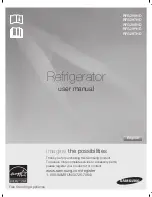
4
OPERATION
Before using
Remove all securing tapes. Wash inside the
appliance with lukewarm water and bicarbonate of
soda (5 ml to 0.5 litre of water).
Do not use soap or detergent as the smell may
linger. Dry thoroughly.
Setting the temperature
The temperature inside the refrigerator is regulated
by a thermostat with 6 temperature positions and an
“OFF” (O) position.
Position 1 = minimum coldness
Position 6 = maximum coldness
Turn the thermostat dial to the required position.
The intermediate position is usually the most
suitable (3-4).
The thermostat setting can vary as the temperature
inside the refrigeration compartment depends on the
following factors:
– room
temperature
– how often the door is opened
– how much food is stored
– position of the appliance
Important
During prolonged periods of abnormally hot weather,
if the thermostat is set on too high a number, the
cooling system may operate continuously and the
fridge cooling plate may not defrost. Turning the knob
to a lower number will cause the automatic
defrosting to resume.
Normal Operating Sounds
•
You may hear faint gurgling or bubbling sounds
when the refrigerant is pumped through the coils
or tubing at the rear, to the cooling
plate/evaporator.
•
When the compressor is on, the refrigerant is
being pumped round, and you will hear a whirring
sound or pulsating noise from the compressor.
•
A thermostat controls the compressor, and you
will hear a faint ’click’ when the thermostat cuts in
and out.
Fresh food refrigeration
To obtain the best performance, do not store warm
food or evaporating liquids in the refrigerator; do
cover or wrap the food, particularly if it has a strong
flavour.
Do not cover the shelves with any protective
material, such as paper, cardboard or plastic, which
may obstruct the air circulation through them.
To help you use your refrigerator correctly, here are
some more useful hints:
Raw meat (beef, pork, lamb & poultry or chicken):
wrap in polythene bags and place on the glass shelf
above the salad crispers.
Meat can only be stored safely in this way for
one or two days at the most.
Fruit & vegetables: these should be thoroughly
cleaned and placed in the bottom salad crispers.
Butter & cheese: these should be placed in special
airtight containers or wrapped in aluminium foil or
polythene bags to exclude as much air as possible.
Milk bottles: these should have a cap and should be
stored in the bottle rack on the door.


































